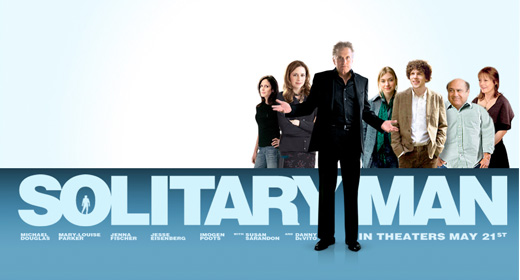Solitary Man (Brian Koppelman, 2010) – Why in the world is this out now? This is usually a pretty lousy time of year for this kind of movie. Solitary Man is an intelligent drama that mixes veteran stars and literate, adult storytelling, with a decent budget and a lean to the mainstream. It could have been released in October or November and given an Oscar campaign, a la Up in the Air. So, why was it released in the middle of summer blockbuster season? Solitary Man is not quite “best picture”, but it deserves a lot more praise than it’s going to get. I certainly will be rooting for Michael Douglas to get some kind of recognition during award season for his performance here.
Douglas has been this good before, many times, so it really shouldn’t be a surprise to see him knock a leading role out of the park (though, with all that is going on in his personal life recently, it is heartening to see such a game effort – I look forward to Wall Street 2). This is a role for which he has a great instinct – an aging ladies man who loves the sound of his own voice and runs frantically from his demons as quickly as he kicks his one-night-stands out of bed. Ben Kalman was a big-shot who had it all and flushed it away. He’s got a gambling addict’s personality, and he treats his life like a game of roulette and all his chips are on black 23. Kalman’s only comfortable in the extremes, where, he says with an earned bitterness, you are always alone. His attempts to save his career and broken relationship with his daughter are thwarted by his reckless tail-chasing, but Douglas never lets his character become a two-dimensional scumbag, showing us with his nuanced performance how he is a victim of his own psychological fears.
Solitary Man bears a striking resemblance to 2002’s Roger Dodger, Dylan Kidd’s fantastic debut feature starring a never-better Campbell Scott in the troubled douchebag role, the difference being that Campbell’s Roger is not nearly as successful in business (and less so with the ladies) as Kalman, yet the running-from-home self-justifying male neurosis is equally on-point. The two films even share some overlap in casting, as the brilliant Ben Shenkman and Jesse Eisenberg turn up in Solitary Man as well (although Koppelman criminally underutilizes them). The male leads from both films have a “high verbal ability” for never-ending bullshit emanating from their mouths that is their Achilles heel.
When I wrote my review of Breaking Upwards, I failed to mention Olivia Thirlby. This was an oversight. Thirlby is a talented young actress who hopefully does not become the next Kristin Stewart, and so far she shows a tendency for the independent and intelligent, which is good. I first took notice of her in David Gordon Green’s Snow Angels, from 2008. (I saw New York, I Love You, in which she starred, and fully intended to review it but never did out of sheer laziness – I apologize – it wasn’t very good). The best scene in Solitary Man, the one that pushes the film to a higher level, is the one Douglas shares with Thirlby at a frathouse party on a Massachusetts college campus. She’s the only other female actor in the film who can hold her own with Douglas, and she delivers a dressing-down we’ve been waiting for. Crucially, Koppelman allows Douglas the parting, devastating, line. I would have been too easy for her to be allowed to simply get on a soap-box and put Kalman in his place.
This is the second directing gig for Koppelman, after Knockaround Guys (which I haven’t seen). In Solitary Man, Koppelman shows his screenwriting roots quite clearly (this is the guy who wrote Rounders, by the way). The entire film is motivated by and generated with words flying out of people’s mouths. The upside is you get great scenes like the one I described above, and you have the potential to get a great, Oscar-worthy performance from an actor who can turn the well-turned phrases into spoken word poetry. The downside is that often something quality on the page doesn’t necessarily translate to quality on the screen. As strong as the script is, there is something schematic about it. While it’s satisfying to see lines repeated that carry different loaded meanings in different scenarios, Koppelman doesn’t always hide his devices with enough truism. One such device – Kalman swallows baby aspirin every morning – is dramatic because it reminds us of his heart issues, yet doesn’t quite jive with Kalman’s reckless personality.
It is unfortunate Jenna Fischer is such a limited actress, because she is given such an important and deep role as Kalman’s patient yet exasperated daughter, for which she shows very little feel. She is actually quite terrible, and often grinds the impulse of the picture’s themes to a halt. Another problem in the film is the overly explanatory final scene. Douglas sits down and chats with his ex-wife and proceeds to unnecessarily explain everything we just saw, and introduces a barely-dramatized element to the story that is suddenly given central attention. It feels forced and unsatisfying.
While not perfect, this is the kind of film I take special pride in pointing out to those who tend to beat up on Hollywood, presumably for being populist and trashy, as evidence that every piece of garbage Hollywood puts out is worth it because the really big earners make it possible for studios to support midbudget projects such as this. “One for them, one for me” can work for studios, too, not just directors, although the ratio isn’t exactly one-to-one. For example, Millenium Films, responsible for Rambo, Righteous Kill, and the upcoming The Expendables (not to mention countless direct-to-DVD action titles), also helped make the superb The Grey Zone, Werner Herzog’s Bad Lieutenant: Port of Call New Orleans, and now Solitary Man. The extra 10 or 15 million dollars big producers give to small dramas like this make all the difference, allowing talented filmmakers to assemble the cast they want, scout the proper locations, and ultimately do justice to the material without having to find financial shortcuts at every turn. Yes, there are compromises and strings attached when you take the money, and you have to make something at least somewhat commercial. But is that always such a bad thing?



